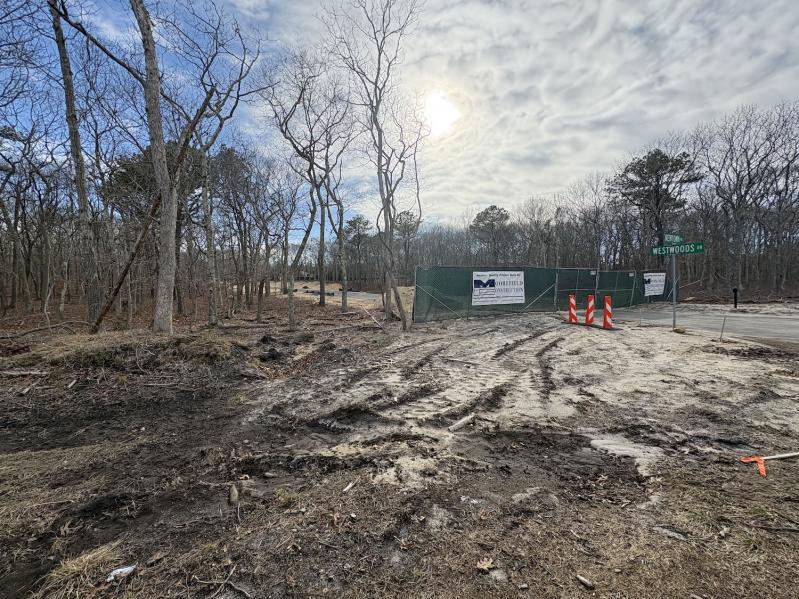In January, when the Shinnecock Indian Nation received confirmation from the U.S. Department of the Interior that its sovereignty extends to the territory known as Westwoods, Lisa Goree and her colleagues on the tribal council should have been able to breathe a bit easier.
A years-long review by the federal Bureau of Indian Affairs had concluded that Westwoods, an 80-acre parcel situated in the hamlet of Hampton Bays, is indeed aboriginal restricted-fee land, under the sovereign management of the tribe.
Instead, Ms. Goree and the council find themselves in fight mode all over again, ready to defend their claim to Westwoods, which is the target of a lawsuit filed in December by Southampton Town over the tribe’s ongoing construction of a gas station and travel plaza at what is often called “the entrance to the Hamptons.”
On March 17, State Supreme Court Justice Maureen Liccione handed down a temporary injunction halting work on the project, dealing yet another blow to the embattled Shinnecock Nation as it seeks new financial outlets to support itself. The tribe plans to appeal the ruling immediately, and the construction site has been dormant since.
Ms. Goree, the first woman to be elected tribal chairperson in Shinnecock history, said in an interview this week that the gas station could bring in hundreds of thousands of dollars yearly for the Nation. The money would support programs such as preschool for young children, social and academic programs for older kids, infrastructure improvements, senior citizen services, and more for the 1,600 enrolled tribal members.
“What we were told months ago [by Southampton Town] was that they were waiting for the Nation to receive its federal land determination,” Ms. Goree said. “And of course, once we received that letter, they still were not satisfied. At this point it’s about control. They want us to go through the motions, so we’ll go through the motions.”
Southampton first slapped a stop-work order on the project not long after it got off the ground in April 2024, and then filed the December suit seeking a permanent halt, claiming that a gas station violates town zoning codes for residential neighborhoods. In court filings, the town argues that “no part of the Westwoods parcel is Indian reservation land.” Furthermore, the town says, the parcel “has not been set aside by the federal government for the use of the Nation, nor is [the tribe] subject to federal superintendence such that it can be considered a dependent Indian community.”
The lawsuit bluntly asserts that the disputed land “is not Indian Country,” and so “the laws and regulations of the town and the state of New York apply to [Westwoods] just as those laws and regulations apply to any parcel of land, owned in fee, located within the town.”
At the heart of the issue is the “restricted-fee” status of Westwoods. This term means it is not taxable by the town because it belongs to a sovereign Indigenous nation, as opposed to “owned in fee” parcels, which are privately held and generally taxable.
Ms. Goree, however, says the town’s own maps clearly label Westwoods as “INDRES,” an abbreviation for “Indian reservation.”
“They know full well that they have never taxed that property,” she told The Star. “Our property has never been zoned residential, yet in their court documents they state that the property is zoned residential. . . . They have always classified it and zoned it as ‘Indian reservation.’ ”
Southampton argues that clearing the land within Westwoods was illegal and that building a gas station there would increase exposure to harmful and flammable materials, “directly injuring the fragile natural environment.” Court filings include drone-style aerial footage of the property. The town also claims that the construction has “increased traffic congestion, noise, pollution, and debris on local roads not designed to accommodate heavy equipment or the increased load.”
The project “has harmful impacts on the town and its residents,” the town adds, saying it has received numerous complaints from people living nearby.
“This town administration has done the ultimate,” Ms. Goree said. “I don’t think previous administrations have actually sought to take control of our land, but this one has.”
Southampton Town Supervisor Maria Z. Moore referred questions this week to James Burke, the town attorney, who could not be reached for comment by press time yesterday.
According to court records, Southampton’s argument relies heavily on a 2007 federal case that initially concluded the Shinnecocks had sold the Westwoods land in the 1600s to John Ogden and Thomas Topping. Those deeds were questioned, and the ruling was later vacated, after a federal judge declared the case should have been heard by a state court. Southampton Town nevertheless uses the deeds in the current case, asserting that “once aboriginal title has been extinguished, it cannot be revived.”
For the Shinnecocks, the gas station lawsuit feels like the hits just keep coming. Its electronic billboards on Sunrise Highway, which it calls “monuments,” are still the subject of a separate case brought against the tribe by the State Department of Transportation. In December, a state appellate court ordered the billboards taken down, but the tribe has not complied.
Ms. Goree gauges public reaction by comments on social media, particularly on the Facebook page of 27east.com, which published the first report on the gas station injunction last week. “Ninety-five percent of the comments” have been in support of the tribe, she said.
“People know that the town has always tried to stop us from anything,” she added. “A lot of people in the town know the history of Westwoods, they know Shinnecock’s plight, and we’ve been fighting for hundreds of years. It’s no different today. It’s a handful of people over in Hampton Bays that abut our property — you read their comments in the paper saying, ‘Oh, the Shinnecocks ruined our beautiful woodland.’ “
“Excuse me, that’s our woodland, and you knew that before that subdivision was even put over there. . . . Just because we didn’t develop it in the past, doesn’t mean we do not have the right to now.”




